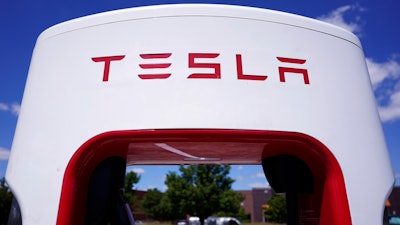
DOVER, Del. (AP) — Delaware's Supreme Court on Monday overturned a judge's ruling upholding a decision by state officials to prohibit electric vehicle maker Tesla from selling its cars directly to customers.
In a ruling last year, a Superior Court judge determined that Delaware's Motor Vehicle Franchising Practices Act prohibited Tesla, as a manufacturer, from selling its electric cars directly to customers in Delaware.
The Supreme Court reversed that decision and sent the case back to Superior Court, noting that the franchise act was enacted to address the disparity in bargaining power that permitted automobile manufacturers to exert economic pressure over their franchises. The justices said the law's definitions exclude Tesla because the company sells its vehicles directly to consumers without using independent franchise dealers.
"It bears repeating that the Franchise Act regulates the business relationship between a manufacturer and a dealer," wrote Chief Justice Collins Seitz Jr., adding that nothing in the law or its legislative history supports DMV's interpretation that the Franchise Act is intended to prohibit the direct sales model.
The court ruling noted that Tesla has fought similar battles in several other states.
Tesla filed an application with the Delaware DMV for a dealer license in 2019. The DMV subsequently permitted Tesla to open a new car gallery in a shopping mall. The gallery allows customers to view Tesla vehicles, but Tesla cannot sell its cars from an in-state store.
Tesla submitted a second application for a dealer license in 2020. The DMV's Chief of Compliance and Investigation denied it, noting that Delaware's Licensing Act for automobile dealers requires that an applicant comply with state law before an application can be granted. The DMV official said Tesla's application did not comply with the law because the Franchise Act prohibits a vehicle manufacturer from directly or indirectly owning an interest in a dealership or from acting as a dealer. Despite determining that Tesla and its direct-to-consumer sales model did not meet the definition of a "new motor vehicle dealer" under the franchise law, the official concluded that Tesla was still a "manufacturer" under the law.
An administrative hearing officer later agreed that, as a manufacturer, Tesla could not sell new vehicles directly to Delaware consumers.
Tesla then appealed to the Superior Court, where it lost again. The judge ruled against Tesla even though he agreed that its business model was likely not contemplated by the franchise law. He also found that a Tesla cannot be defined as a "new motor vehicle" because that term applies to a vehicle that has been sold to a dealer. The judge also concluded that Tesla is not a "new motor vehicle dealer" because it does not enter into franchise agreements with third parties.
"When the definitions are read together, a 'manufacturer' under the Franchise Act manufactures or assembles 'new motor vehicles' that have been sold to a 'new motor vehicle dealer,'" Seitz wrote. "… Tesla's electric cars will not be sold to a dealer that holds a valid sales contract by Tesla, and therefore it is not a 'manufacturer.'"






















